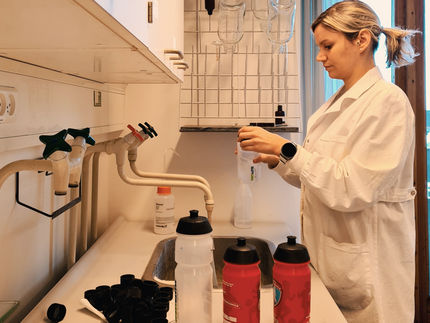Right first time: Pioneering new methods of drug manufacture
Engineers at the University of Leeds have developed a simple technology which can be used in existing chemical reactors to ensure "right first time" drug crystal formation. Ensuring drug crystals are formed correctly is crucial to their efficacy and the efficiency of pharmaceutical manufacturers' operations. Using self-assembled monolayers, the team has been able to show that crystals form into their desired product form with the correct shape and particle structure, without the usual problems of polymorphism which results in huge losses to the pharmaceutical sector each year.
"If you imagine the way that oil sits on top of water, that's similar to how the monolayer works," says Professor Kevin Roberts of University's Faculty of Engineering. "We've shown that we can produce a well-defined crystal structure using a self-assembled monolayer bound onto a metal substrate within a regular reactor. This is exciting stuff, because it's a relatively simple system, but could make a huge difference in the efficiency of drug manufacture."
One of the first stages of the crystallisation process is called nucleation. During nucleation, particles are introduced into a reactor to encourage the formation of crystals. However, the way in which this is currently carried out is difficult to control and can often lead to the wrong shape, size or structure of drug crystal, something which affects the usefulness and efficacy of the compound.
The new system proven to work by the Leeds team, working alongside Ana Kwokal from Croatian pharmaceutical company PLIVA, has shown that introducing a self-assembled monolayer – a layer of self-organising molecules that is attractive to the substance being crystallised – into a reactor enables consistent crystal formation.
Professor Roberts says: "Because this is a really simple solution to ensuring consistent crystallisation, it has huge potential commercially. Our next steps are to make sure it's just as efficient on an industrial scale." This work draws on previous research and experimental systems developed through the Chemicals Behaving Badly II initiative, an Engineering and Physical Sciences Research Council (EPSRC) programme which includes universities and industrial partners.
Most read news
Topics
Organizations
Other news from the department science

Get the life science industry in your inbox
By submitting this form you agree that LUMITOS AG will send you the newsletter(s) selected above by email. Your data will not be passed on to third parties. Your data will be stored and processed in accordance with our data protection regulations. LUMITOS may contact you by email for the purpose of advertising or market and opinion surveys. You can revoke your consent at any time without giving reasons to LUMITOS AG, Ernst-Augustin-Str. 2, 12489 Berlin, Germany or by e-mail at revoke@lumitos.com with effect for the future. In addition, each email contains a link to unsubscribe from the corresponding newsletter.





















































